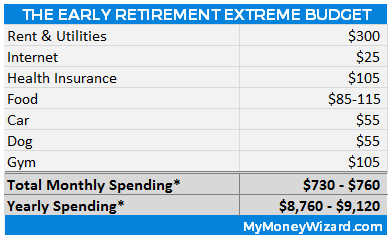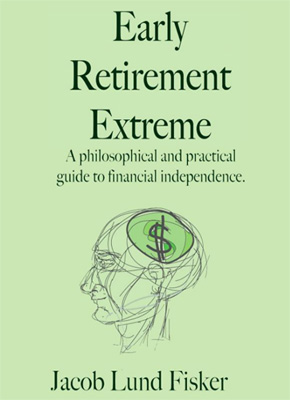

Welcome to the second edition of the Financial Freedom Spotlight Series! If you missed Episode 1, these posts are all about highlighting people who fast tracked their freedom.
Retiring in your 60s is worth getting some balloons and cutting a cake, but it doesn’t count here. We’re looking at people who made work totally optional in their 30s and 40s!
By sharing their success stories, hopefully we can all find some practical takeaways to help our own paths to financial independence.
The Financial Freedom Spotlight #2: Jacob Fisker
If our first financial freedom spotlight featured the grandfather of early retirement, then this one features the movement’s Great Grandfather.
Jacob Fisker is the blogger behind EarlyRetirementExtreme.com, and the author of the book with the same name.
Jacob’s claim to fame is retiring from full time work at age 33, which is impressive enough by itself. But even crazier:
Jacob’s entire career, start to finish, was only 5 years long!
If you’re curious how this guy retired faster than it took me to finish college, let’s dive in:
The Timeline of an Extremely Early Retirement
Jacob grew up in Denmark, which he credits for his unique perspective on life, money, working, and his approach to retirement.
Denmark also has one other big advantage for the early retiree – free college!
He went to college in his home country, maintaining the necessary GPA to keep his full-ride rolling. He graduated debt free, then moved onto grad school.
While working on his master’s, Jacob guesses he earned $20-25,000 a year after tax. This allowed him to avoid student loans, then he pulled an even wiser move…
Free master’s degree in hand, he jetted out of the country before its crippling taxes ate away his savings rate.
He immigrated to the United States, and began pursuing his PhD. In those 5 years, Jacob earned:
- Age 28: $40,000
- Age 29: $41,000
- Age 30: $42,000
- Age 31: $67,000
- Age 32: $69,000
The entire time, he saved at least 75% of his take home pay.
And then….
Ta-da!!! Jacob retired at 33.
At this point, you probably have as many questions as I did.
How to Retire with a Nest Egg of Only $240,000
By age 33, Jacob’s few quick years of saving over 70% of his income left him with a portfolio large enough for its passive income to cover his living expenses.
While Jacob isn’t as transparent with his net worth as yours truly, he’s left enough hints in his writings to conclude he retired with somewhere around $240,000 of savings.
How can a portfolio less than $250,000 support all his living expense and then some?
Well, Jacob is frugal.
Really frugal.
Try, “living on just $7,000 a year” frugal.
And yes, that $7,000 covers everything. But we’ll get to that in a minute…
With his ultra-low living expenses, his quarter million-dollar portfolio needs to generate just 2.9% a year to support his lifestyle, forever.
Which means, as crazy as it sounds, Jacob’s decision to retire with around $240,000 is actually pretty darn conservative. He took The 4 Percent rule and bumped it down to The 3 Percent Rule for good measure, which all but ensures he’ll never run out of money.
If we reframe the numbers for an average family living on $50,000 a year, this is equivalent to retiring with a $1.7 million portfolio, which sounds far less extreme.
What does still sound crazy though, is living off less than half of minimum wage.
The Monthly Budget of the Man Who Lived On $7,000 a Year
Jacob provides details of his monthly budget on his blog, which I’ve adjusted to 2018 dollars.

Yep, that’s it.
You’ll notice Jacob does most of his money saving on The Big 3 – housing, cars, and stuff.
Housing:
In the way of Early Retirement Extreme, a house is a place for shelter, and not a storage unit for toys and collections.
As such, Jacob’s rule for housing is $200-300 per month per person. Obviously, what you can buy varies by location, but he considers this number absolute. In his words, “If I want to live in a ‘nicer place’ it simply translates into a (much) smaller place and vice versa.”
And there’s no limit to the creativity allowed. Jacob frequently discusses the possibility of living arrangements in everything from full houses, roommates, caretaking, dorms, tents or RVs in a national park, and even houseboats.
Which did Jacob choose?
While living in San Francisco, Jacob and his wife first lived in a house for $330 per person per month. Eventually, they moved into an RV in the Bay Area for $240 per person. In retirement, the couple relocated to Chicago, where they rented an apartment for about $270 per month each, before eventually buying a house in Chicago, where his fixed expenses now total… you guessed it… about $300 per month.
We’ll get to how he eventually afforded the house purchase in a minute.
Cars:
Again, Jacob gets creative. He views transportation as a means to get from Point A to B, which can be accomplished through a wide variety of strategies, including walking, running, cycling, public transportation, and occasionally, cars.
He gets into a whole host of reasons why cars aren’t actually as efficient as we’re led to believe, which include the cost of maintenance, the time spent waiting at stoplights, and the hours spent working to afford them.
As such, his default mode of transportation is cycling for any trip 3 miles or less. For longer trips, he leans towards public transport, and for leisure activities, he and his wife share a car.
Given his $55 dollar mark includes the cost of insurance + gas, he’s obviously chosen an older, paid off car, and the two drive it pretty infrequently.
Stuff:
Not surprisingly, Jacbo’s not a big fan of stuff.
He says he ventures into the mall about once a year as a sort of social experiment, but can never find anything he wants.
BUT, that’s not to say he never buys anything. One of his key strategies is owning stuff for free.
How?
He’s a big fan of Craigslist, and he frequently finds a good deal on a used something-or-other, keeps it for a few years, and then sells it for roughly the same price he bought it for.
He also occasionally splurges on high quality stuff, when he feels the value is there. For example, he owns a $275 pocket knife that’s supposedly one of the rarest, most well-made pocket knives in the world. He says he could resell it for $400+, which negates the true cost a bit.
Life After Retiring at 33
So, what’s a 33-year retiree to do with his life?
Well, after retiring in 2009, Jacob kept up the RV life until 2011. In retirement, he spent most of that time living what he calls “The Renaissance Man” lifestyle.
In Jacob’s world, a Renaissance Man is his own Leonardo de Vinci, capable of mastering lots of trades and being fully self-sufficient. It’s a strategy that keeps him interested in life, constantly learning new things, and carries the added benefit of never really having to spend any money.
So, in retirement, Jacob kept learning new skills.
Instead of relying on dinning out, he learned how to cook delicious meals at home. When his dishwasher broke, he spent a few days learning how dishwashers work and how to fix them, rather than paying a plumber to do it for him. He learned how to change his own car oil, lubricate its parts, and eventually graduated towards disassembling the drive train and engine.
At the same time, he reduced hobbies that cost money and took up ones that were free or even profitable.
He replaced his hobby of buying computer parts with learning how they work, which eventually led to getting paid as a system administrator. Instead of paying to go to the movies, he borrows them from the library or reads for entertainment. His interest in reading about science led to occasionally getting paid as a proof reader.
Around the same time, he also finished his book and continued writing for his blog.

He kept at this game of knowledge gaining for three years, before his retirement threw him a curveball.
In 2012, despite still being financially independent, he was approached for what he called a “bucket-list” career opportunity to work on a financial project he’d have gladly worked on for free.
He retired his blog (which is no longer updated and instead recycles old posts on auto-pilot.) He packed up the RV and moved from San Francisco to Chicago, where he and his wife found a rental cheap enough to fit within their $14,000 a year budget.
Jacob worked on this project in Chicago for four years, earning about $80,000 a year.
In 2014, they bought a suburban house in cash, with the purchase price no doubt aided by his book sales, which he says have earned him around $250,000 to date, plus his newfound high paying salary that he had no use for.
In 2016, he again retired. He and his wife now live in their paid off house, spending about $10,000 a year, mostly on property taxes, utilities, insurance, and food.
His net worth has grown to over $900,000 (by my calculations from hints in his writings) and Jacob continues to enjoy his early retirement as a “Renaissance Man.”
My Thoughts on Early Retirement Extreme
People tend to have one of two immediate reactions to quirky ‘ole Jacob.
- Either they immediately write him off as a frugal kook, and fire up their own defensive reasons why they could never live on just $7,000 a year. Or…
- They go all-in on the Kool-Aid, downsizing their house, selling everything they own, and joining the cult of Early Retirement Extreme.
But I think both of those reactions miss the general point.
It’s a common problem when us bloggers post up our real-life numbers. The reader tends to get lost in the details, while missing the bigger, more overall message.
Here are my takeaways on that message:
1) He makes you question everything.
One of my favorite moments in the book came when he calculated the average cost a full kitchen would add to rent, and then calculates the equivalent cost of having no kitchen and just eating out for every meal.
While he eventually decides that it is, in fact, beneficial to make your food at home, this sort of critical thinking about the world’s assumptions is an incredibly useful skill.
Anyone wondering, “where’s his cell phone bill?” is asking the wrong question. The more interesting question is, “why does anyone need a cell phone?”
In a society where everyone defaults to what everybody else is doing, Jacob’s a refreshing example of somebody willing to challenge the status quo.
And while I personally find a cell phone as an expense worthy of delaying my retirement a little bit for, Jacob’s spending (or lack-thereof) highlights how every one of our spending decisions is, actually, a decision.
This realization is critical if you want to buck the trend and start saving huge amounts of money.
2) He’s an extreme example.
He’d say he’s not, and that he regrets putting “Extreme” in his blog/book’s title.
And I’d counter that by saying, “Uh… yeah dude, you’re living on third world wages… sounds pretty extreme to me.”
But there’s nothing wrong with the fact that he’s extreme. We usually learn the most from extremes.
We learn about inventions from the wild outliers who try something new. We learn about the limits of human endurance from the rare athletes willing to stress themselves to the breaking point. And we learn about how little it takes to reach financial independence from Jacob’s complete lack of spending.
3) Yeah, no kids…
And having kids would have probably prolonged his working career by a few years. But c’mon, this is the guy who only buys one color of socks, so he can most efficiently replace the lost pairs. You don’t think he’d have found a way to raise kids pretty cheaply?
4) Most importantly, Jacob is a great example that truly anyone could reach financial independence, if they wanted to.
Lost in all the chatter about frugality and cost cutting is that Jacob’s story is really freakin’ inspiring.
Less than $7-9,000 a year is peanuts. Minimum wage workers double that.
He’s living proof of how much excess fat there really is in all of our budgets. Even if you think you’ve cut those expenses as low as they go, chances are, Jacob’s proof you can go lower.
Personally, his lifestyle seems a little too frugal for me. Which is why my annual spending is 2-3 times as much as his.
Then again, I’ve never tried living off $7,000 a year. Maybe I’d be pleasantly surprised…
The point is, when we become aware of how our choices are impacting our savings, and therefore our timeframe for financial independence, we start to see the strings that control the play.
We realize everything is in our control, and we recognize every choice for the tradeoff that it is.
Readers, what do you think about Jacob’s story? What age are you choosing to reach financial freedom?
You can see all the posts from the Financial Freedom Spotlight Series here.


Wow. And i thought i was frugal.
This article gave me some great ideas on how to live more frugally. But i doubt i would or want to live on 7K a year.
But the message and lesson is inspiring. We all can save more than we already are. Maybe I’ll start buying the same color socks from now on. That was a great tip.
Great write up on Jacob@ERE! I’ve known his story for a long time, and he’s a truly impressive example of the power of frugality!
I’m reasonably frugal but I’ve never been able to get our core expenses below minimum wage levels. Jacob’s low spending is just amazing.
He really shows us that *anyone* can do it… if they really set their mind to it.
I read Jacob’s book and blog. I am fascinated by his level of frugality. I don’t know if I could be quite that extreme!
I liked your takeaway, to question everything.
I did want to mention that Denmark’s “crippling taxes”. are what pays for free education in that country!!
My father was like this, no/cold showers and all. That’s why my sister and I make big salaries in lucrative occupations and enjoy living upper middle class lifestyles. Just making those “choices” all the time is pretty tiring, and always saying “no” was not as much fun as saying yes is.
Yeah, I definitely think his extreme frugality is more “fun” when it’s a personal choice, rather than somebody else pushing it on you.
Wow that is absolutely crazy! $7k in a year is like those expats living on the Southeast Asia lifestyle.
It’s good to be frugal but this story is definitely quite extreme.
I would not skip on having children just because they cost money. Also, $100 for food a month just because you don’t want to work. You end up eating noodles and other cheap foods even if you cook and never have a joy if going out to eat once in a while.
His health insurance is going to be more than $100/m when he gets older. With all the activities he does outdoors, why does he need $100 gym membership? That seems silly!
Anyway, I would rather work extra 5 years to have a little more comfortable lifestyle in retirement and also be able to afford having at least one child which is priceless and more valuable than not working or having more money in the bank.
Yes, I agree that there’s no point in skipping on kids just to save money. Money is just a tool for happiness. If having kids makes you happy, then there’s no reason why you shouldn’t have them.
That is frugal to the extreme. I wonder what part of Chicago does he live. I also live in the Chicago area (West Suburbs) but boy that $300 a month fixed expenses is unthinkable.
Jacob’s story destroys any excuses to spend, and not to save. If one wants, one can. I am wondering how he invests his savings.
He buys and holds individual stocks. He says he likes this better than index funds, but he’s never been able to convince me with his reasoning.
Great article, but as many have stated, Jake’s chosen lifestyle isn’t for me. I want to be financially independent, but I don’t want to live like a pauper to achieve it. My wife and I save over $110k/year but won’t consider ourselves finished with our working until we can generate $8k per month. Sure there are free things that retirees can do, but I also want the ability to do premium activities, too.